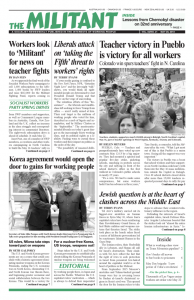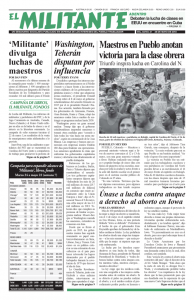After an outburst of criticism from supporters of political rights, the bosses at the Federal Bureau of Prisons announced May 3 they were halting their new policy severely restricting workers behind federal prison bars from being able to get and read books. Under the policy, which had been in effect for months, ordering through the mail from publishers, bookstores and book clubs was banned and free book shipments from friends and relatives were quashed.
Inmates could only order books through one prison-approved vendor — the name of which prison authorities have not revealed — and the price would be marked up by 30 percent.
According to memos by prison wardens obtained by the media, inmates had to go through a seven-step ordering process with the approved vendor, and submit their requests for a book with title, author and the 13-digit ISBN number for each volume!
Government officials refused to say in how many of the 122 federal lockdowns these restrictions were being implemented. The rollout of the policy included Virginia and California, with plans to do the same in Florida this month.
In justifying this policy, the Federal Bureau honchos put out a statement claiming it was necessary because “inmate purchased books provide an avenue for introduction of contraband.”
I guess inmates all over the country were ordering from Barnes and Noble and somehow getting the company to scoop out the insides of their books and fill them with drugs, hacksaws or AK47s.
These memos have now been rescinded and new policies are under review, the bureau said in an email to the media, “to ensure we strike the right balance between maintaining the safety and security of our institutions and inmate access to correspondence and reading materials.”
A similar move in New York state last December sharply restricted prisoners’ ability to purchase books to six vendors, who sold only a couple dozen titles, limited mostly to religious themes, games and coloring books. But an outcry from supporters of prisoners’ rights pressured Gov. Andrew Cuomo to halt the program the following month.
“Moves by federal authorities to impose restrictions on access to books, newspapers and other literature that prisoners want to read is a flagrant violation of constitutional rights,” said Militant editor John Studer. “The Militant has faced censorship by prison officials because of its politics and coverage of struggles by working people. So far our protests, with support from other defenders of free speech and the press, have beaten back most of these.
“Workers behind bars deserve the right to read what they want and think for themselves without any barriers put in their way by prison authorities,” Studer said. “And the Militant has the right to get to its subscribers.”

